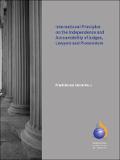| dc.description.abstract |
Reseña:The judicial system in a country is central to the protection of human rights andfreedoms. Courts play a major role in ensuring that victims or potential victims ofhuman rights violations obtain effective remedies and protection, that perpetratorsof human rights violations are brought to justice and that anyone suspectedof a criminal offence receives a fair trial according to international standards. Thejudicial system is an essential check and balance on the other branches of government,ensuring that laws of the legislative and the acts of the executive comply withinternational human rights and the rule of law.This crucial role has been highlighted by all inter-governmental human rights systems.The United Nations General Assembly has repeatedly stated that “the rule oflaw and the proper administration of justice […] play a central role in the promotionand protection of human rights” 2 and that “the administration of justice, includinglaw enforcement and prosecutorial agencies and, especially, an independent judiciaryand legal profession in full conformity with applicable standards contained ininternational human rights instruments, are essential to the full and non-discriminatoryrealization of human rights and indispensable to democratization processesand sustainable development”.3The United Nations General Secretary General has emphasised the fact that “[i]ncreasingly the importance of the rule of law in ensuring respect for humanrights, and of the role of judges and lawyers in defending human rights, is beingrecognized”.4The Inter-American Court of Human Rights has said that “[g]uaranteeing rightsinvolves the existence of suitable legal means to define and protect them, withThe judicial system in a country is central to the protection of human rights andfreedoms. Courts play a major role in ensuring that victims or potential victims ofhuman rights violations obtain effective remedies and protection, that perpetratorsof human rights violations are brought to justice and that anyone suspectedof a criminal offence receives a fair trial according to international standards. Thejudicial system is an essential check and balance on the other branches of government,ensuring that laws of the legislative and the acts of the executive comply withinternational human rights and the rule of law.This crucial role has been highlighted by all inter-governmental human rights systems.The United Nations General Assembly has repeatedly stated that “the rule oflaw and the proper administration of justice […] play a central role in the promotionand protection of human rights” 2 and that “the administration of justice, includinglaw enforcement and prosecutorial agencies and, especially, an independent judiciaryand legal profession in full conformity with applicable standards contained ininternational human rights instruments, are essential to the full and non-discriminatoryrealization of human rights and indispensable to democratization processesand sustainable development”.The United Nations General Secretary General has emphasised the fact that “[i]ncreasingly the importance of the rule of law in ensuring respect for humanrights, and of the role of judges and lawyers in defending human rights, is beingrecognized”. The Inter-American Court of Human Rights has said that “[g]uaranteeing rights involves the existence of suitable legal means to define and protect them, withintervention by a competent, independent, and impartial judicial body, which muststrictly adhere to the law, where the scope of the regulated authority of discretionarypowers will be set in accordance with criteria of opportunity, legitimacy, andrationality”. Similarly, the Inter-American Commission on Human Rights has pointedout that “the independence of the judiciary is an essential requisite for the practicalobservance of human rights”. The Commission also considered that “[t]he right to afair trial is one of the fundamental pillars of a democratic society. This right is a basicguarantee of respect for the other rights recognized in the Convention, because itlimits abuse of power by the State”. |

